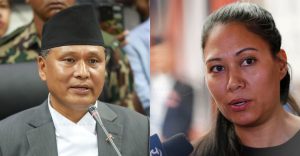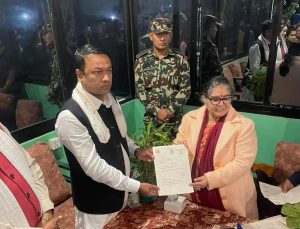KATHMANDU — Energy Minister Kulman Ghising, known for ending Nepal’s long electricity crisis, is moving closer to formally entering politics through a new organization named Ujyalo Nepal Party.
Preparations are underway to register the party with the Election Commission, marking a new phase in Nepal’s evolving political scene. According to sources, former Energy Secretary Anup Kumar Upadhyay will coordinate the 51-member central committee.
While Ghising currently serves as a minister in the interim government led by Prime Minister Sushila Karki, he will remain less active in party affairs until leaving office. Party insiders say they have agreed to propose an electric bulb as the election symbol — a reference to Ghising’s legacy of lighting up the nation.
Differences Over Leadership and Party Identity
Earlier, Ghising held discussions with lawmaker Sumana Shrestha, who recently left the Rastriya Swatantra Party (RSP), and Sudan Gurung, founder of Hami Nepal, to form a single reform-oriented front.
However, after weeks of negotiation, Ghising and Shrestha decided to proceed separately. In a conversation with , Shrestha confirmed that they had chosen “different directions for now,” adding, “He has moved ahead. I wish him all the best.”
According to Shrestha’s close aides, she was initially ready to back Ghising as party president if he resigned from his ministerial post. However, friction arose after Ghising proposed former secretary Upadhyay as coordinator instead of leading the party himself.
Shrestha’s faction argued that the movement following the GenZ protests deserved leadership rooted in that generation’s reform spirit rather than bureaucratic figures. She had also suggested alternative names such as Nepal Vikas Dal and Nepal Jansewa Party, saying that “Ujyalo Nepal” might sound too personality-centered.
In contrast, Ghising maintained that the name “Ujyalo Nepal” reflected public recognition of his contributions and symbolized hope and progress. The disagreement extended beyond naming.
Shrestha advocated a collective leadership model, proposing a council-based structure instead of one dominated by a single figure. In a Facebook post, she wrote, “It’s time to move away from individual-centric politics.
Let ideas and actions, not faces, define leadership.” While Ghising’s supporters emphasize that a visible leader is vital for clarity, Shrestha’s team believes sustainable change requires shared responsibility and issue-based politics.
Future Possibilities of Alliance
Despite current differences, both leaders have left open the possibility of future cooperation during elections. “We might form an alliance later,” Shrestha noted, expressing optimism that shared reformist values could bring the groups together again.






